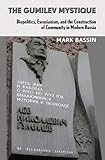The Gumilev Mystique : Biopolitics, Eurasianism, and the Construction of Community in Modern Russia / Mark Bassin.
Material type: TextSeries: Culture and Society after SocialismPublisher: Ithaca, NY : Cornell University Press, [2016]Copyright date: ©2016Description: 1 online resource (400 p.) : 7 halftonesContent type:
TextSeries: Culture and Society after SocialismPublisher: Ithaca, NY : Cornell University Press, [2016]Copyright date: ©2016Description: 1 online resource (400 p.) : 7 halftonesContent type: - 9781501703393
- 305.80092 23
- online - DeGruyter
| Item type | Current library | Call number | URL | Status | Notes | Barcode | |
|---|---|---|---|---|---|---|---|
 eBook
eBook
|
Biblioteca "Angelicum" Pont. Univ. S.Tommaso d'Aquino Nuvola online | online - DeGruyter (Browse shelf(Opens below)) | Online access | Not for loan (Accesso limitato) | Accesso per gli utenti autorizzati / Access for authorized users | (dgr)9781501703393 |
Browsing Biblioteca "Angelicum" Pont. Univ. S.Tommaso d'Aquino shelves, Shelving location: Nuvola online Close shelf browser (Hides shelf browser)

|

|

|

|

|

|

|
||
| online - DeGruyter Arctic Mirrors : Russia and the Small Peoples of the North / | online - DeGruyter The Prince of Darkness : Radical Evil and the Power of Good in History / | online - DeGruyter Accidental Activists : Victim Movements and Government Accountability in Japan and South Korea / | online - DeGruyter The Gumilev Mystique : Biopolitics, Eurasianism, and the Construction of Community in Modern Russia / | online - DeGruyter "I Love Learning; I Hate School" : An Anthropology of College / | online - DeGruyter Disability and Employer Practices : Research across the Disciplines / | online - DeGruyter Making Immigrant Rights Real : Nonprofits and the Politics of Integration in San Francisco / |
Frontmatter -- Contents -- Foreword -- Acknowledgments -- Introduction -- Part 1. Gumilev’s Theory of Ethnos and Ethnogenesis -- 1. The Nature of Ethnicity -- 2. Ethnogenesis, Passionarnost′, and the Biosphere -- 3. Varieties of Ethnic Interaction -- 4. The Ethnogenetic Drama of Russian History -- Part 2. The Soviet Reception of Gumilev -- 5. Soviet Visions of Society and Nature -- 6. Ethnicity as Ideology and Politics -- 7. Gumilev and the Russian Nationalists -- Part 3. GUMILEV AFTER COMMUNISM -- 8. Neo-Eurasianism and the Russian Question -- 9. Biopolitics and the Ubiquity of Ethnicity -- 10. “The Patron of the Turkic Peoples” -- Conclusion: The Political Significance of Gumilev -- Bibliography -- Index
restricted access online access with authorization star
http://purl.org/coar/access_right/c_16ec
Since the collapse of the Soviet Union, the legacy of the historian, ethnographer, and geographer Lev Nikolaevich Gumilev (1912–1992) has attracted extraordinary interest in Russia and beyond. The son of two of modern Russia’s greatest poets, Nikolai Gumilev and Anna Akhmatova, Gumilev spent thirteen years in Stalinist prison camps, and after his release in 1956 remained officially outcast and professionally shunned. Out of the tumult of perestroika, however, his writings began to attract attention and he himself became a well-known and popular figure. Despite his highly controversial (and often contradictory) views about the meaning of Russian history, the nature of ethnicity, and the dynamics of interethnic relations, Gumilev now enjoys a degree of admiration and adulation matched by few if any other public intellectual figures in the former Soviet Union. He is freely compared to Albert Einstein and Karl Marx, and his works today sell millions of copies and have been adopted as official textbooks in Russian high schools. Universities and mountain peaks alike are named in his honor, and a statue of him adorns a prominent thoroughfare in a major city. Leading politicians, President Vladimir Putin very much included, are unstinting in their deep appreciation for his legacy, and one of the most important foreign-policy projects of the Russian government today is clearly inspired by his particular vision of how the Eurasian peoples formed a historical community. In The Gumilev Mystique, Mark Bassin presents an analysis of this remarkable phenomenon. He investigates the complex structure of Gumilev’s theories, revealing how they reflected and helped shape a variety of academic as well as political and social discourses in the USSR, and he traces how his authority has grown yet greater across the former Soviet Union. The themes he highlights while untangling Gumilev’s complicated web of influence are critical to understanding the political, intellectual, and ethno-national dynamics of Russian society from the age of Stalin to the present day.
Mode of access: Internet via World Wide Web.
In English.
Description based on online resource; title from PDF title page (publisher's Web site, viewed 26. Apr 2024)


